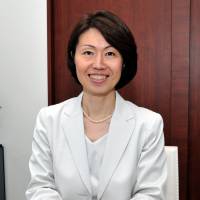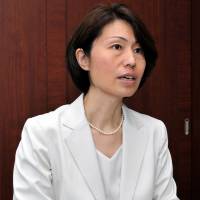In the increasingly cynical world we live in it seems like true believers are becoming a dying breed. The cold, hard reality of everyday life having taken a toll on optimism and enthusiasm.
Good news, these days, sometimes appears as elusive as finding the Holy Grail. A nonstop stream of war and economic strife dominate the airwaves, further darkening the present and future.
However, every once in a while, if you are lucky, you come across a person that has an altruistic vision for helping others. That was the case recently when I spoke to Mie Kajikawa, the founder of Sport For Smile, a non-profit organization dedicated to having a positive impact on the less fortunate and providing them access to sports.
Kajikawa, a native of Ichinomiya, Aichi Prefecture, has taken a diverse background and marshaled her energy and connections to help make her mark both in Japan and in other countries.
The motto of her organization is "Uniting People, Bettering the World."
"I started this five years ago, when I finished up my work with the 2016 Tokyo Olympic Bid Committee," Kajikawa said in a recent interview with The Japan Times. "I am committed to using the power of sport to improve society and change the world. My mission is to provide access to sport to those who may not otherwise have the opportunity."
When asked why she had embarked on this particular initiative, the 44-year-old Kajikawa said her education and travels overseas had led her to an awakening.
"I realized there was a big movement at the global level to use the power of sport to change the world, but in Japan it was not being delivered," she stated. "I felt it was my mission to deliver that concept into Japan."
Kajikawa, who played college basketball at Nagoya University, worked at a travel agency for three years after graduating with a degree in sociology in 1994. She says that volunteering at the 1998 Nagano Olympics is where she first began to see sport as a universal language.
After working in the private sector for several years it was her association with basketball that led her to further her education abroad in 2003.
Kajikawa attended graduate school at Ohio University in the United States and earned a master's degree from the school's presitigious sports management program. She focused on the "business of basketball" and says that she hoped to bring her knowledge back to Japan and improve the sport here.
One of Kajikawa's papers was "Examining the Initial Marketing Strategies of Relocated Franchises in the National Basketball Association: For Japan's Proposed Professional Basketball League." She says her study of basketball also began a long relationship with FIBA and NBA personnel, as well as other executives in North American sports, which she maintains to this day.
Her time in Ohio led to an internship with the Detroit Pistons, who were just coming off a championship season when she joined them in 2005. Kajikawa wrote a book in Japanese about her time with the Pistons.
"I played basketball for 20 years and learned life skills and had good mentors as a result," Kajikawa noted. "Basketball was my life. I had good friends and experiences and I wanted to give back to basketball."
When Kajikawa returned home, however, she found the game here in disarray. Two leagues (bj-league and JBL) with little communication and interest in working toward the greater good of the game resulted in a lack of prospects for her.
"I was hoping to work for an integrated basketball system when I got back to Japan but there was no position for me, so I went to the Tokyo 2016 Olympic Bid Committee," Kajikawa said.
When that job ended she made plans to start Sport For Smile (www.sport4smile.com).
Kajikawa says it was not easy to construct a group from scratch.
"I started out with almost nothing, but I had a network," she commented. "I started by investing my money and some from one of my friends."
Kajikawa's group hosted its first event, "Sport For Smile Lounge" back in September 2011 when she brought together more than 80 people to see how they could bring about social change through sport. An official from the United Nations Office on Sport for Development and Peace spoke to the group via Skype and she began an association with that body that is ongoing.
Since then Kajikawa has organized events like "Sport For Smile Square" which unites volunteers with those that have disabilities or are from disadvantaged backgrounds to mutually enjoy sports.
"We are serving as a platform to partner with NGOs and isolated communities," Kajikawa said. "We are trying to help. We ask them to implement sports and provide access to them."
In 2011, Kajikawa was honored with the Ernst & Young Groundbreakers Award for her service in providing sports organizations with cause marketing advice through her consulting company Cheer Blossom, which operates Sport For Smile. She has also made presentations on her vision at international events.
Kajikawa said resources are not easy to come by when organizing her projects.
"We need money to implement programs going forward," she said. "We are hoping to start a donation system this year to fund our social projects.
"One of our programs is "sports mentoring," which we started in 2014 in Tokyo with a Korean organization. We pair up a university student with a child from a disadvantaged family. They go to the gym together and use sports to build trust and gain self-confidence."
When asked if celebrity endorsers would help grow her brand, Kajikawa said that bigger isn't necessary better and she wants people who understand exactly what she is trying to achieve.
"It's hard to get ambassadors for sport for social change in Japan because they must have a global mind-set," she stated. "We have advisers who are high-profile in the global community for exposure, that is enough for now. The athletes we are seeking must understand the sport for social change concept."
Kajikawa feels incremental growth is the best course for Sport For Smile for the time being.
"I need to create a solid community who can understand sport for social change. That is my concept," she said. "I don't need to scale out so rapidly.
"My goal is to create ripples for change, not create a wave," Kajikawa added. "My goal is making an impact by bringing smiles to people of need rather than by being big."


















With your current subscription plan you can comment on stories. However, before writing your first comment, please create a display name in the Profile section of your subscriber account page.